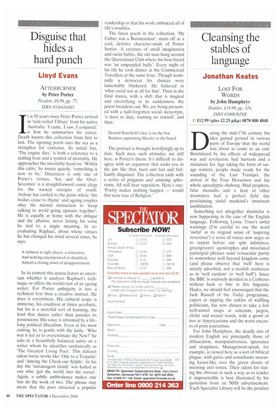Disguise that hides a hard punch
Lloyd Evans
AFTERBURNER by Peter Porter Picador, £8.99, pp. 77, ISBN 0330434365
It is 50 years since Peter Porter arrived in `rain-veiled Tilbury' from his native Australia. 'I came, I saw, I conjured,' is how he summarises his career. Death haunts this collection from first to last. The opening poem uses the sea as a metaphor for existence. Its initial line, 'The engine dies,' is both a reference to a stalling boat and a symbol of mortality. He approaches the inevitable head-on. 'Within this calm,' he muses quietly, `something is now to be.' Directness is only one of Porter's virtues. `Sex and the OverSeventies' is a straightforward comic elegy for the wasted energies of youth. Ardour has cooled to the point where 'the bodies cease to rhyme' and ageing couples obey the mental instruction to `keep talking to avoid going upstairs together'. He is equally at home with the oblique and the allusive, never letting his verse be tied to a single meaning. In reevaluating Raphael, about whose virtues he has changed his mind several times, he says: A richness in right places, a saturation. And nothing extemporised or dandified, Almost a closing down of disappointment.
In its context this stanza leaves us uncertain whether it analyses Raphael's technique or offers the world-view of an ageing writer. For Porter ambiguity is less a technical feat than a creative instinct. He does it everywhere. His cultural scope is immense, his erudition at times acrobatic, but his is a merciful sort of learning, the kind that shares rather than parades its possessions. His voice is informed by a lifelong political liberalism. Even at his most cutting, he is gentle with the knife. 'Who was it led us to overestimate the New?' he asks in a beautifully balanced satire on a writer whom he identifies sardonically as 'The Greatest Living Poet'. This defunct talent wrote works like 'Ode to a Torpedo' and 'Among the Check-out Sylphs'. In his day the `intransigent dandy' was hailed as one who 'got the world into his verses'. Again, a subtle ambivalence makes one line do the work of two. The phrase may mean that the poet attracted a popular
readership or that his work embraced all of life's troubles.
The finest poem in the collection, `My Father was a Businessman', starts off as a cool, derisive character-study of Porter Senior. A creature of small imagination and racist habits, the old man hung around the Queensland Club where his best friend was `an empurpled bully'. Every night of his life he took dinner at the Commercial Travellers at the same hour. Though nominally a democrat his choices were lamentably blinkered. He believed in 'what cared not at all for him'. Then in the final stanza, with a shift that is magical and electrifying in its suddenness, the poem broadens out. We are being presented with a half-forgotten social stereotype, 'a slave to duty, wanting no reward', and then: Donald Rumsfcld's face is on the box, Business appointing Murder to the board.
The portrait is brought horrifyingly up to date. Such men, such attitudes, are still here, is Porter's thesis. It's difficult to disagree with an argument that socks you in the jaw like that, hard and fast and brilliantly disguised. The collection ends with a series of poignant and amusing aphorisms. All will bear repetition. Here's one: 'Poetry makes nothing happen — would this were true of Religion.'


















































































 Previous page
Previous page